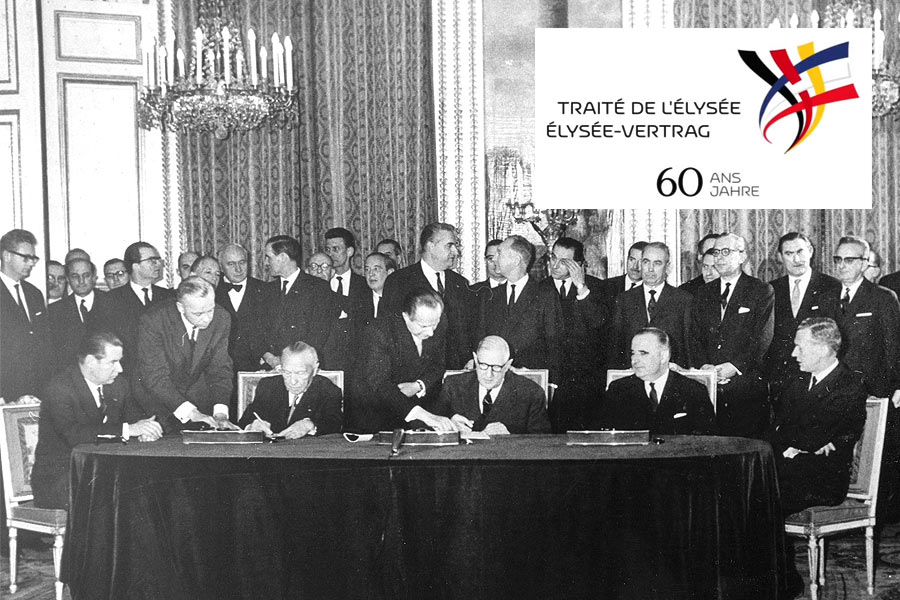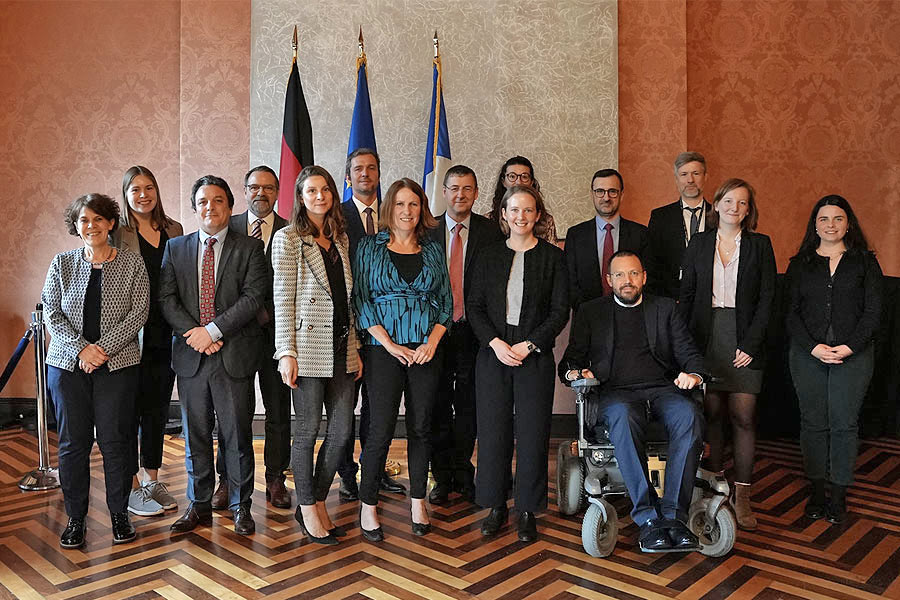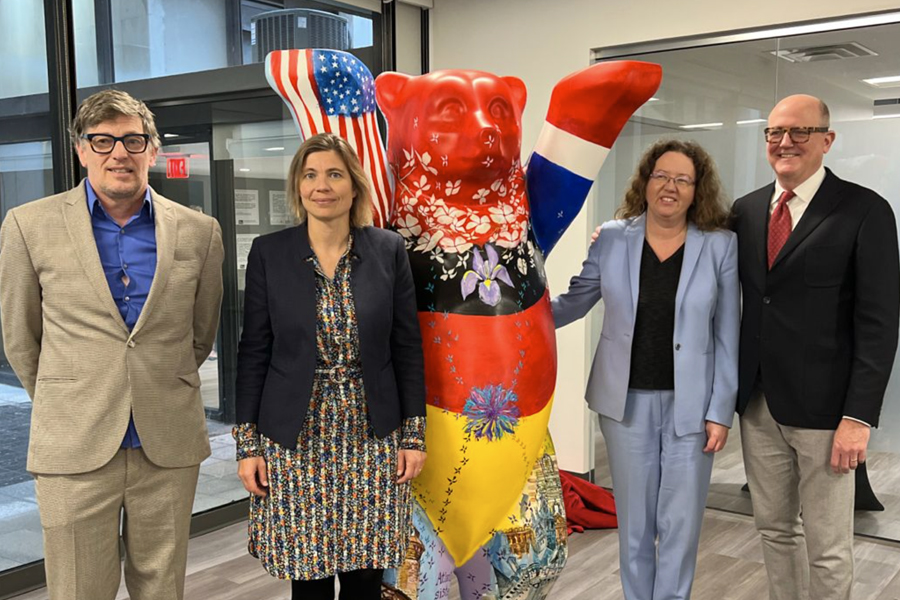60th anniversary of the Élysée Treaty – Germany and France: “Building our Europe for the next generation”
60th anniversary of the Élysée Treaty – Germany and France: “Building our Europe for the next generation”
60th anniversary of the Élysée Treaty – Germany and France: “Building our Europe for the next generation”
SUMMARY
President Emmanuel Macron and Chancellor Olaf Scholz have jointly written an opinion piece on the future of the Paris-Berlin "couple" in the service of the European Union.
Published by Le Journal du Dimanche and the Frankfurter Allgemeine Zeitung, this text highlights the issues on which France and Germany will work as a priority in the coming months.
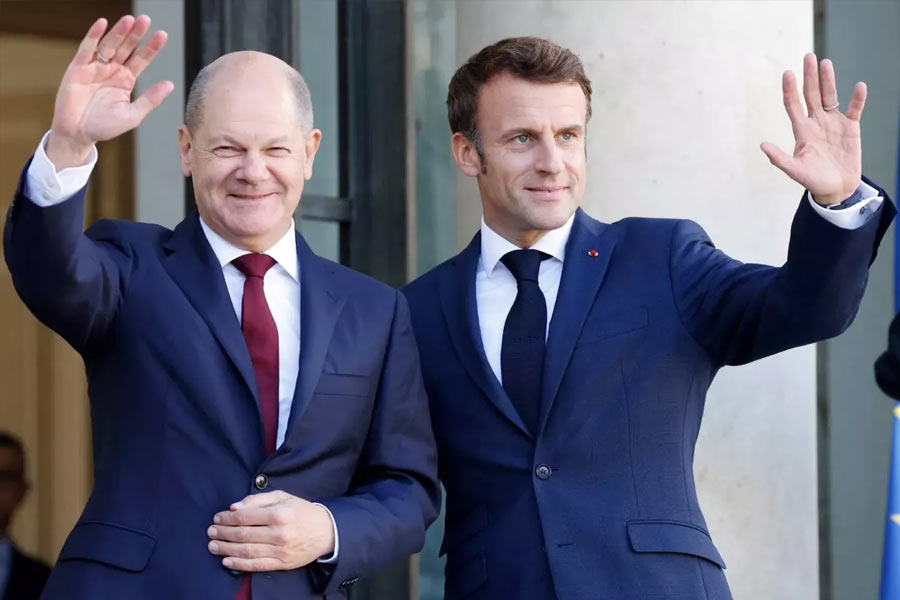
Metadata
Release date: January 23, 2023
Tag(s): Culture, Diplomacy, Foreign policy, History

Metadata
Release date: January 23, 2023
Tag(s): Culture, Diplomacy, Foreign policy, History
An Op-Ed co-signed by French President Emmanuel Macron and German Chancellor Olaf Scholz
60 years ago, President Charles de Gaulle and Chancellor Konrad Adenauer signed the historic Élysée-Treaty. We, French and Germans, are all the children of this watershed moment that overcame decades, if not centuries, of bitter rivalries and bloody wars between our two peoples at the heart of Europe. The signing of the Treaty was a dramatic gesture of reconciliation. Not even twenty years after the end of the horrors of the Second World War, unleashed by Germany, this was not at all self-evident. Instead, it took the moral braveness to close a tragic past. It took the lucidity to recognize that this long history that our two countries have spent vying each other had to lead to a future shoulder to shoulder. Because our youth, from one bank to Rhine to the other, had the right to live in peace and build a better future.
This joint destiny has evolved into something bigger than our two countries: The Elysée-Treaty did aim to renew the bilateral relations of our two countries. But more than that: It formulated an aim for both peoples, to cooperate towards the common dream of a united Europe.
At the heart of this pledge for a shared future, there was the refusal of any war, any barbarism, any imperialism. And the lasting peace in our Europe has been the proof that this dream was reachable. In 2022, Russia brought back war to Europe and made the Ukrainian people suffer at this very moment an excruciating hardship.
Since the beginning of the war, we have acted fast and strong. We have provided Ukraine with political, financial and humanitarian support, delivered tons of weapons and ammunitions and trained Ukrainian soldiers. All our steps are well-coordinated with our partners and demonstrate to the Ukrainian people that we stand with them. Russia should not succeed and will not succeed with its illegal and brazen war of aggression in Ukraine.
The war against Ukraine is a reminder that our generation has the task to impede the Founding Father’s dreams from unravelling. This Zeitenwende led to the strategic reawakening that gave body to the objective of European sovereignty. And now, we have to make sure again, that the next generations of Europeans will be able to live in a continent of peace, prosperity and liberty. In this historic moment, we all have to find the courage of audacity, unity and lucidity. President de Gaulle and Chancellor Adenauer paved our path – and we are committed to be at the height of their dream: We feel compelled to ensure that by the time our children grow up as citizens of our continent, our European Union will be an even stronger leading power of hope.
We know from many conversations, that our partners and friends in Europe share these convictions. It is together with our European partners and friends that we want to turn these shared convictions into reality. To build our EU for the next generation, we want to work towards seven strategic goals.
The first key challenge for us will be to ensure that Europe becomes even more sovereign with the geopolitical capacities to shape the international order. For a strong Europe tomorrow, it is crucial now to invest more into our armed forces and into the base of our defense industries in Europe. This will improve our own defense capabilities, thus also benefit the transatlantic relationship. Improved European capabilities and a stronger European pillar in NATO will provide the United States with a stronger partner on the other side of the Atlantic – better equipped, more efficient and more powerful to tackle key international challenges.
Secondly, geopolitical power not only derives from military means but also from resilience and our capability to act in strategic areas for our future. We will strengthen the diversification of strategic supplies and our capacities in critical areas and will take the path towards becoming the world’s first climate neutral continent. Respecting national choices for the energy-mix we will achieve this, especially via renewables and low-carbon energies, energy efficiency and hydrogen, which we will produce and import, together with strong energy interconnections. We will work on improving the functioning of the electricity market and engage in common gas purchasing at the European level. We want to strengthen our strategic partnerships with all those who are eager to defend the international order as enshrined in the Charter of the United Nations. We want to promote free and fair trade as a cornerstone of our prosperity. In order to diversify our trade relations, we support an ambitious trade agenda with the WTO at is core and modern trade agreements with partners around the world.
Thirdly, we want the European Union to continue its way towards becoming a leading production and innovation area at global level. We will make sure to set the right framework and provide the means to reach this goal, and advance what lies at the heart of our global economic power: the world’s largest democratic Single Market, whose 30th anniversary we celebrate these days. We will strongly advocate the promotion of an ambitious strategy to boost European industrial competitiveness, and a European environment that sparks competition and innovation, which is a precious common good of the EU.
It is, fourthly, the strengthening of the European unique model to ensure that economic and social progress go hand in hand with the green transition. For us this means first and foremost to remain at the forefront of the fight against climate change and the loss of biodiversity, and to support and enable our citizens to master the challenges of and benefit from the green transition, leaving no one behind. We want to advance Europe’s common social and taxation standards, paving the way to more social convergence and equality strengthening our collective ability to offer European workers more quality, skilled and better paid jobs.
Fifthly, speaking about the next generation is to speak about our ability to invest, which must match our ambitions and values. Therefore, we call for more ambitious steps towards a Capital Market Union and to complete the Banking Union. Member States will continue to ensure fiscal sustainability, including by improving the quality of their public finances and by giving priority to investment and reforms necessary to the green and digital transition and to key elements of European sovereignty. This should be underpinned by an efficient Union budget investing in European public goods, equipped with genuine own resources.
Then, as much as the economy matters, what we want to bequeath our children is what Europe is really about: individual freedoms, the rule of law and democratic participation – and about protection of its citizens. These values and principles are at the heart of the European Union. Therefore, the European Union should continue to be a staunch protector of European citizens and their freedoms. We must continue our work in favor of the rule of law and individual freedoms, set norms at the international arena, for example in the digital sector. Imports into the European Union must comply with our safety, human rights, environmental and social standards. We want to secure free movement, notably for learners, and more effective external border controls.
Finally, these ideals are not only a strong reason for the European Union’s attractiveness, near and far. They are also the reason why the European Union serves as a beacon of stability on the European continent, not least in the Western Balkans. We strive for swift and tangible progress in the enlargement process of the Union. And at the same time, we must ensure that an enlarged European Union retains its capacity to act – with more efficient EU-institutions and with faster decision-making processes, notably by extending qualified majority voting in the Council.
Sixty years after the signing of the Élysée-Treaty France and Germany are aligned on the fundamental questions of Europe’s future. We share the same ambition for a resilient, powerful and sovereign European Union. Even where we differ, we remain as determined as ever to develop common answers – answers that we want to explore together with our European partners. We are at a turning point in the history of our continent. Our generation has the task to shape with its dreams the future of the next one. The work to complete, improve and strengthen our Europe is gigantic but sixty years of history has taught us that nothing is impossible if we remain united.
Related posts
